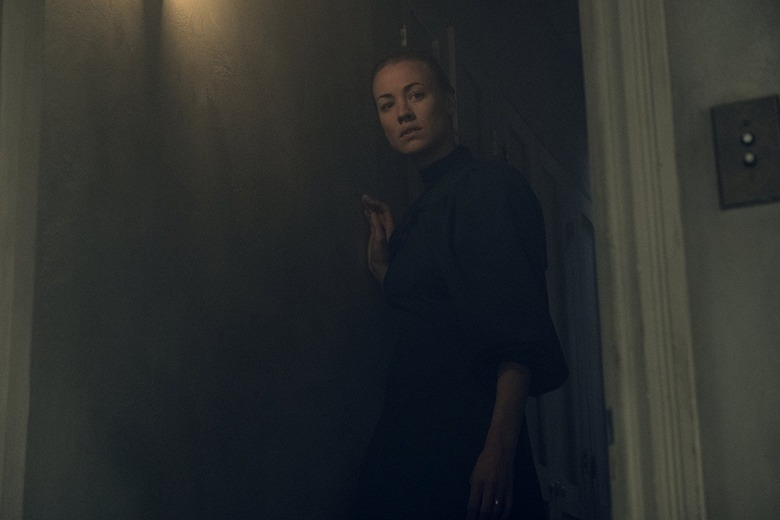'The Handmaid's Tale' Review: "Other Women" Is A Portrait Of One Woman Being Broken
(We're going to kickstart our weekly The Handmaid's Tale review by answering one simple question: Who suffered the most?)
Thus far this season of Handmaid's Tale has been bigger in every way — in scope, in world-building, in characters, and in its capacity for torment. But "Other Women" pulls the series back drastically in all of those elements as June gets corralled back to her old life at the Commander's house — except, of course, in the torment.
The fourth episode of season 2 is an odd duck. No longer is there the sharp fear of the unknown as June attempts to escape Gilead. Instead, we've returned to the dull ache of the season 1 status quo — familiar, but no less horrifying. The callbacks to earlier episodes are pervasive, as June goes through the motions of life as a Handmaid, but with a newfound insolence after her brief brush with freedom. This is the rebellious June that we were waiting to emerge for all of season 1, the one who lived up to her sarcastic musings. And "Other Women" spends its entire 54-minute runtime slowly wearing her down until she's a shadow of the woman we first met.
Who Suffered The Most? June
Okay, I know it's feeling redundant to choose June every week — especially after I made a big hoopla about this season being less June-focused — but it's not redundant to say that this episode is truly June's darkest moment.
"Other Women" is the slow breakdown of June's will, and it's alternately horrifying and fascinating to watch. It's here that you can finally understand how June drastically transformed from a woman with agency to the submissive, unresisting Handmaid of season 1. But worse yet, the episode condemns us, the audience. Every time June taunts Serena Joy or defies Aunt Lydia, I could feel Handmaid's Tale daring me to not wish that she wouldn't rattle the cages. Because "Other Women" doesn't just wear down June's will, it wears down ours. It's doubly an attack on her spirit as it is on the audience's, forcing us to silently plead with June to put her head down, hold her tongue, survive.
June spends the first half of the episode staring daggers at Aunt Lydia and Serena, as if daring them to do something. She's bolder and angrier than before — and more reckless. So when June begins to teeter on the edge of madness (Elisabeth Moss continues to outdo herself each week with a particularly chilling performance), egged on by Lydia's machinations and Serena's renewed abuse, it feels appalling, yes, but it's also almost unsurprising. I mean, this is The Handmaid's Tale, we're watching. They can only dial the terror up to 11.
Aunts and Wives
Speaking of dialing things up to 11, we get almost a cartoonish amount of Aunt Lydia this episode. Lydia becomes a live-ins with the Waterfords, barging into June's baths and making her smoothies while watching her like a hawk. This could easily be overkill, but Ann Dowd is just so entrancing to watch in all her malevolent glee. She's got the cheery demeanor of a Dickensian villain — throwing around phrases like "rub a dub dub" and taking on a maternal air with June that rings overwhelmingly false. And it turns out that Lydia is also the only thing standing in the way of Serena's rage when June's jabs go too far.
Serena is an interesting counterpart to Lydia here. While Yvonne Strahovski seethes like no other and undoubtedly gives her all in each episode, her performance lacks the duality of Dowd's. While Dowd toes the line between sympathetic and sinister, Serena has always been defined by her simmering jealousy, in "Other Women" more so than ever. The only change is that this isn't romantic jealousy but maternal jealousy over June's ability to carry her child.
Meanwhile, Dowd delivers a performance that can only be described as performative gaslighting. I mean that in a good way — Dowd lures you into a sense of security with her incredibly emotive eyes that shine with genuine concern for June, before she rips that away again. You're only reminded that she's a villain when she takes June to the Wall, where the body of Omar, June's rescuer, is hanging. It's the final nail in the coffin for June's breakdown. June breaks down in guilt-wracked sobs as Lydia chides her like a child for being a "selfish girl." But then Lydia offers her an out: it was June who did those things, not Offred.
June vs. Offred
By the end of the episode, June is dead. Offred has returned, dead-eyed and has subjugated as ever, barely responding to Nick's desperate calls and eerily chanting, "We've been sent good weather," until I decided that I hate all weather.
But that separation between June and Offred is no longer a defense mechanism for June to hide her true feelings as a means of survival, it's full-on disassociation. "June" becomes the vessel for all of her guilt — guilt over Omar, over her endangering her baby, over her fellow Handmaids who were left mutilated in her wake. And that guilt is compounded in the brief and only set of flashbacks we see in the episode, where June meets Luke's wife Annie. For once she sees the victim of her affair, and the embittered woman who will be left husband-less and child-less in her wake — another woman who suffered (supposedly) because of her.
All traces of June disappear over the course of "Other Women." Even the faux Latin phrase carving in her closet is painted over, leaving Offred without her last place of shelter. And when she puts on her old Handmaid dress, the scene is given a false, ironic exuberance, presenting it like a superhero suit scene rather than the prison uniform it actually is.
Tale Tidbits

